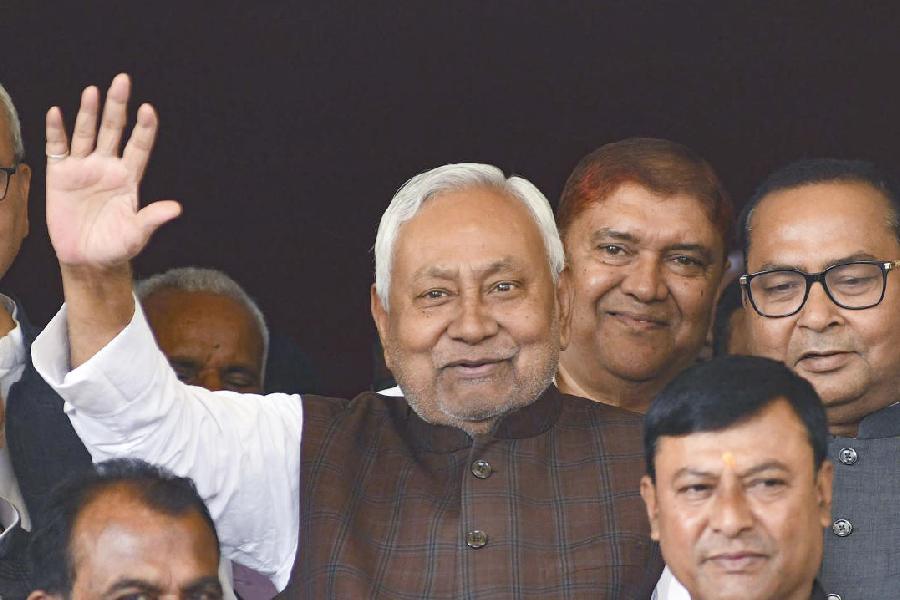 |
He raises his hands, ducks his head, heaving a polo shirt over his shoulders. But it is clearly too tight for him. “Is there anyone who is listening to me,” he hollers in mock anger. “Get a shirt that fits me.”
That’s possibly the most difficult thing for his assistants on the set of a television show to find — a shirt that fits Mir Asraf Ali. Or Mir, the “family” name that he has picked for himself, the name that has stuck — both with his admirers and detractors.
In some ways, his life is all about donning attires, of different shapes and colours. The 33-year-old has been a newscaster, radio jockey, anchor and, as he puts it, a “walk on” actor, having recently played a role in film-maker Anjan Dutta’s Bong Connection. He is also trying his hand at writing newspaper columns.
What, however, has made Mir an instantly recognisable face — and voice — in Bengal is his way with words and his incomparable skills at impersonating a vast array of celebrities, from magician P.C. Sorcar to actor Mithun Chakraborty. He takes on their voices inimitably, curling their words out of shape and leaving his audiences in splits. To Mir, mimicry is an “art form” that apes life, warts and all.
Not everyone looks at it the same way, though. Certainly not all of those who are the butt of his on-screen jokes. Taking strong exception to the way Mir imitates him in public, film-maker Rituparno Ghosh ripped into him in his television talk show last month which featured the anchor, and tore his mimicry to shreds.
Ghosh said he was not as much perturbed by his caricature of him as of the way Mir “projected the sexual minority,” showing them in a poor light by highlighting their stereotyped effete ways.
But Mir remains unfazed. “I don’t think I am doing anything illegal. If he feels that way, he should take it up with the authorities concerned,” he retorts.
But it’s equally clear that Ghosh’s reaction troubles him. “What rankles me is his remark that mimicry is an inferior form of art or that I earn my livelihood solely from it, which is certainly not true as there are plenty of other things that I do,” Mir says.
Paradoxically, the public sparring (Mir has already hit back at Ghosh in an open letter) has added to his fame. “Mir has won public sympathy in the entire episode. It was certainly in poor taste to insult or humiliate someone you had invited to your talk show,” says a Tollywood actor.
For his part, Mir says now even a “roadside teawallah” knows of him. “But this is the last thing I want, getting publicity for all the wrong reasons,” he adds. The way he looks at himself, he has always been a rebel without a cause.
But something snaps in him when someone refers to his religious identity the way, he says, the film-maker did in the talk show. Ghosh pointed out that Mir belonged to a minority community, but didn’t use his Muslim surname. Clearly, Mir Afsar Ali hasn’t forgotten the days when he was asked to sit at a separate table in a classmate’s birthday party after his mother learned that he was not “Mihir (usually a Hindu name) but Mir.”
It was not easy either to marry a Hindu girl on May 16, 1997, exactly two years after they first met. His wife, Soma Bhattacharjee, was then a final year medical student and had come to see him at the FM radio station, drawn by the magic of his voice. Mir says his wife’s parents found not just his religion hard to take but his professional identity as well. He was then little more than a “voice” that was merely heard on the radio.
Mir stresses that all his life he has tried to avoid being ghetto-ised, both physically and mentally. Born in a village in Bengal’s Murshidabad district, Mir, an only child, was raised in Calcutta by his parents, who could shower him with love and affection, but little else.
His draftsman father made all of Rs 600 a month working as a manager at an interior designing company. Yet Mir Sultan Ahmed would not give up. In his free time, he would sit outside Calcutta’s General Post Office typing letters and documents for a fee on a ramshackle Remington to put his son through the Assembly of God Church School, a fact Mir now stresses.
“The only thing I always had on my mind was how to finish school,” he says. From an early age, he had resolved not to join the swelling ranks of dropouts from neighbouring Muslim families who lived along Ripon Street in central Calcutta, where he grew up. When he felt low, his parents reminded him that he was their only “investment.” The Ali family had no property or land anywhere, not even in their village.
But that August afternoon of 1987 remains etched in his mind. He had just returned from school when someone knocked on the door. Before he knew it, a few local thugs barged in and started tossing out whatever the family had. The tenant who had sublet the flat to his father had lost a court case against the landlord.
The family picked up their belongings from the roadside and took shelter in a neighbouring factory, where they shared a shed for a month or so at night with some local masons.
Like his schoolmates, Mir was a regular child but a smile seldom flickered across his drawn face, a fact Mir now cannot help but smile at. After all, making people laugh is what he does best today.
If anything, Mir says luck has always played a pivotal role in his life. How else is he going to explain what happened on that rainy day in 1994? He was returning home from a neighbourhood store toting a set of ironed clothes. Suddenly, his eyes fell on the wet newspaper the clothes were wrapped in: an advertisement for a radio jockey. It was the last date for applications.
For someone raised on a daily diet of Bengali songs and plays on the radio through the 1980s and early 1990s, Mir felt it was a “godsend.” He applied and was chosen as a radio jockey. The rest, as they say, is history.
Fourteen years on, Mir stays “smitten” by the radio, going to the FM station every morning to host his breakfast show in a “fixed” taxi instead of his car. On the way, he says he talks politics and everything else with the middle-aged cabbie from Bihar who “knows more about what’s happening in the country than I do.”
In a way, this ritual is also his way of staying in touch with his roots, with the people that still matter to him.
At times, Mir says he marvels at what he has accomplished. The gift of the gab was the last skill he had as a boy. He still remembers how he squirmed and almost died of embarrassment when he forgot the lines of a Bengali poem in front of a 2000-strong audience in a school function.
But all that belongs to the past now. Everything in his life has changed. Now he finds himself closer to his father-in-law, a reputed doctor from Durgapur, than to his father. He wants to don new shirts, trying his hand at film-making. He wants to open a school too where he will teach television anchoring.
Rituparno Ghosh may have torn apart his mimicry robe, but Mir seems determined to mend it and put it back on. Yes, he says he will continue to do what he does best: impersonating the film-maker and his ways. For that is Mir — love him, or hate him.










